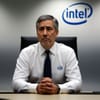Intel's CEO, Lip-Bu Tan, has made a candid admission that it's "too late" for the company to catch up with Nvidia in the AI competition. This statement comes as Intel faces significant challenges, including a substantial loss of market share and a decline in its position among semiconductor companies. Tan emphasized that Intel has fallen out of the top 10 semiconductor companies globally, highlighting the company's struggles in AI and data center computing.
In response to its struggles, Intel is pivoting towards edge AI, aiming to bring AI processing directly to devices like PCs rather than relying on cloud-based compute. This strategic shift is expected to help Intel capitalize on emerging opportunities in AI-enabled devices. The company is also exploring agentic AI, which involves autonomous AI systems that can operate independently without constant human input.
Intel's struggles are further complicated by its manufacturing delays and increased competition from rivals like AMD and Nvidia. The company has been laying off thousands of employees worldwide as part of a cost-cutting initiative, with reports suggesting that up to 20% of its global factory workforce could be affected. Tan's leadership marks a departure from his predecessor's expansive strategy, focusing on streamlining operations and cutting costs.
While Intel faces significant challenges, Tan remains cautiously optimistic about the company's future. He has emphasized the need for cultural transformation and a more agile approach to innovation. With a renewed focus on edge AI and foundry services, Intel aims to regain relevance in the rapidly evolving semiconductor landscape.


